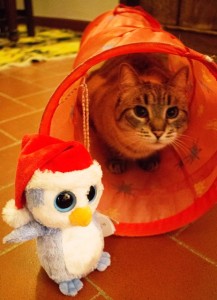Oh for crying out loud, here we go again — an article on early treatment for smoldering myeloma folks who have no CRAB symptoms, not One Single One.
My favorite thing to read.
Not.
You can read the entire article (it’s not long, just a couple of pages) here: http://goo.gl/aHdpS6
Interesting excerpt: Before enrollment in an SMM treatment trial, patients should be aware that the “watchful waiting” approach remains a legitimate strategy given the body of current evidence. It is important to note that there is significant discordance (>70%) in the overall SMM patient risk classification and that prospectively obtained risk models are not yet widely in use. Thus, better predictive models and biomarkers need to be validated prospectively before one can determine an individual’s lifetime risk of disease progression with certainty. Despite recent advances, the standard of care of SMM remains a “watchful waiting” approach, as larger international randomized studies and longer follow up are awaited.
Yes indeed, I fully agree that it is important to note that MORE than 70% of the experts disagree on how to classify us smolderers. MORE THAN SEVENTY PERCENT??? Wow, that’s so amazingly encouraging…
Not.
Well, at least these researchers lists “treatment toxicity” for SMM patients as a “concern,” since there is no way of predicting who might progress to active myeloma and who might remain at this stage forever.
They also mention the fact that current treatments can give rise to “serious toxicities.”
This part of the article, if not the entire article, shows, at least to me, how doubtful and hesitant our myeloma experts are, and that was very interesting to note. At one point, e.g., they wonder “whether the benefits of treatment of SMM are justifiable in the light of the risks involved.” (You can imagine what my answer would be…)
And it is precisely the discussion about the risks involved that most intrigued me…So let’s have a closer look at the myeloma cell subpopulation section (at the beginning of page 1770).
First, what are these subpopulations? The article provides the answer: “at MM diagnosis, recent data inform us that there is no single clonal population of malignant plasma cells but rather different subpopulations that are branching off an original clone.”
While the researchers themselves admit that very little is known about HOW these subpopulations interact, it seems that they COMPETE for survival in the tumor microenvironment).
I can’t help it — my mind is now filled with battle scenes from the movie “Braveheart” — swords, axes, clubs, spears, heads bashed in, blood, guts, body parts everywhere…except in this case we have myeloma cells fiercely charging and whacking away at other myeloma cells…But okay, I’m getting a bit carried away…
Let’s step back for a moment and imagine that the subpopulations of myeloma cells in SMM folks are in a sort of delicate balance: there are groups of really nasty evil slobbering myeloma cutthroat criminals floating around and coexisting with groups of relatively innocuous myeloma dumbbells. They’re all just hanging out, without causing any serious injuries or damage, at least for the time being.
But then, at a certain point, all these subpopulations get smacked over the head with a bunch of chemo drugs.
The first to go are the weakest ones.
This means that we are left with the potentially dangerous bad cutthroats who’ve managed to escape the chemo bombs…
Let’s also not forget something that I don’t think the article mentions at all but that is CRUCIAL: chemo bombs don’t differentiate between good and bad cells. This means that the tumor microenvironment has been changed radically now: the weak myeloma cells are gone…but so are the good cells…
So what happens then? Without their weaker rivals, the cutthroats have more room in which to move around in as well as more opportunities to proliferate and wreak havoc in their newly-changed surroundings. In my Braveheart scenario (which is based on what I have read here and elsewhere), this seems to fall under the expression “clonal evolution” used by the researchers in that helpful red and green table, the one with the red question mark on top.
I don’t know about you, but I find this potential scenario really freaky…
Therefore, given all these unknowns, given all these risks, why (OH WHY????) jump the gun and intervene before it’s necessary? It simply makes ZERO sense. Let’s summarize the main points:
- The experts themselves can’t agree on how to classify us smolderers.
- There is no way of knowing what happens when chemotherapy is administered to someone who has no CRAB symptoms.
- Treatment toxicity is a real concern. Not a potential one.
- Last but not least, it seems that the potential for strengthening the super evil, stronger, more resistant-to-treatment myeloma subpopulations is E-NOR-MOUS.
Too risky. Too dangerous.
In sum, this article merely reinforces my conviction that early intervention — both in a clinical trial setting and, worse, in a non-trial setting — sucks…
big time…










 When you visit the Domus Aurea, don’t expect to see anything but the massive original structure. Here and there you will see some color on the walls and even a few painting details, but the palace is pretty much bare. It is still underground, and it is still being restored and renovated, which means that you have to wear hard hats during the entire visit, as you can notice in these two photos, above and below. It’s also a guided tour, but I missed most of what our guide told our group because I was always too far behind, taking photos of everything…
When you visit the Domus Aurea, don’t expect to see anything but the massive original structure. Here and there you will see some color on the walls and even a few painting details, but the palace is pretty much bare. It is still underground, and it is still being restored and renovated, which means that you have to wear hard hats during the entire visit, as you can notice in these two photos, above and below. It’s also a guided tour, but I missed most of what our guide told our group because I was always too far behind, taking photos of everything…
